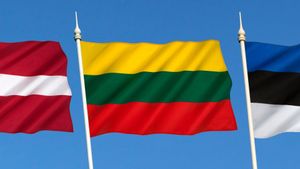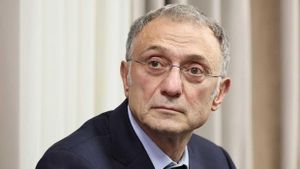Vadim Stroykin, the 58-year-old Russian singer and outspoken critic of President Vladimir Putin, has died after reportedly falling from the tenth floor of his apartment building in Saint Petersburg. Stroykin's tragic death occurred on Wednesday, shortly after police visited his home to investigate his alleged donations to the Ukrainian military.
Accusations against Stroykin could have led to serious legal consequences, with potential sentences of up to twenty years for his actions. Local authorities opened a preliminary inquiry, which many suspect will label the incident as suicide, according to Russian news agency Ria Novosti.
Details surrounding his fall suggest it occurred during police questioning related to criminal allegations. Reports from Ria Novosti indicate, "The police came to see him for a search related to a criminal case. During this, Stroykin reportedly went to the kitchen… and fell". His fall raises alarms about the risks faced by dissenters within Russia.
Stroykin was also known as a radio host and guitarist who had gained notoriety for his strong criticism of the Kremlin's actions. A post on the social media platform VKontakte from 2022 included condemnation of Putin as "this idiot who declared war on his own people as well as on a brother nation." He called for the president's trial, stating, "I do not wish for his death; I want him judged and sent to prison."
His death isn't just another tragedy; it positions Stroykin among numerous Russians who have died under mysterious circumstances. His passing is reminiscent of recent cases involving other opposition figures and dissenters. Notable incidents include Ravil Maganov, the former Lukoil president, who died after falling from the sixth floor of a hospital, and Marina Yankina, who was found dead after falling from her apartment's sixteenth floor.
According to the independent Russian weekly The Moscow Times, witnesses claimed Stroykin was last seen alive near the window of his kitchen, where he allegedly went to drink water. Reports suggest he "suddenly opened the window and committed the irreversible act," as shared by the Telegram channel Mash, which is believed to be linked to Russian security services.
The official narrative surrounding Stroykin's death has drawn skepticism, with many questioning whether it was truly suicide or part of the Kremlin's broader campaign against dissenters. The past several months have seen intensified crackdowns against those who have openly opposed the government, leading to speculation about the safety of critics of Putin's regime.
Not only is Stroykin's death alarming for its immediate impact, but it reflects the broader climate of fear facing those who dare to speak out against the government. The British newspaper The Telegraph has reported on this increasing trend since the advent of the Ukraine conflict, where public dissent has been met with severe repercussions.
The atmosphere of intimidation persists, fueled by the historical precedents of deaths and disappearances among Kremlin critics. The demise of Alexei Navalny, the well-known opposition leader, earlier this year remains surrounded by unanswered questions and theories, leading to unease among the dissident community.
Even before his untimely fall, Stroykin was symbolic of the struggle faced by numerous Russians who voice their dissent against the regime. His stature as both an artist and critic left many wondering about the price of free speech under Putin's rule.
He leaves behind not only his music— which includes haunting tracks like "Requiem of the Present"—but also a legacy of courage for those who resist oppressive governments. Stroykin's fall from grace may mark merely another suspicious incident, but it resonates as part of the grim narrative of dissent and danger faced by those who oppose the Russian government.
While investigations continue, the silence surrounding Stroykin's passing speaks volumes about the risks of dissenting voices within Russia. The world watches as the story of Vadim Stroykin becomes but another addition to the chronicle of mysterious deaths of those daring to challenge the authority of the Kremlin.



